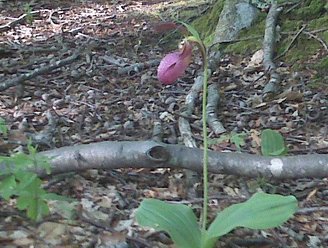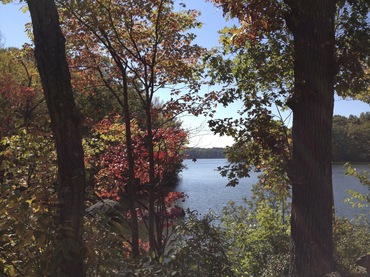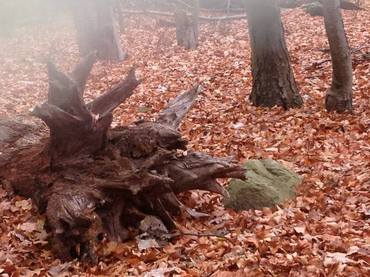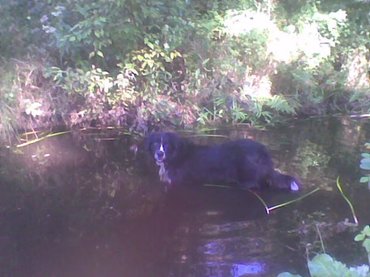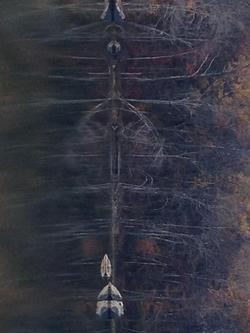Lincoln woods. Early summer. Lady slipper.
A priest visited the woods with his coffee every morning; like me (and my dog) he was a regular. Sometimes, we exchanged a few words, then continued on, traveling silently to our private respective spots.
The priest usually wore jeans. He had a semi scruffy beard and looked like the kind of guy who ate kale chips and showered with peppermint soap. He was kind of cute. I didn't know he was a priest until I saw him on the trail in a suit and tie. When I teased him about his clothing, he revealed he'd just delivered a funeral mass at his church. His face looked distressed. I left him alone.
The woods were in Lincoln, Rhode Island; 600 acres of trees and granite boulders, surrounding a deep, expansive pond; characterized by an undramatic yet gentle New England beauty. Off season, off hours, off road -- the woods were blissfully empty. Other regulars included a widower with two spaniels and an artist who stuffed quartz in her pockets that weighed down her pants. We didn't speak much, but we knew each others names. Acknowledging one another in the quiet morning was comfortable. It was as if we shared a collective secret. It was better than being a regular at a bar.
I enjoyed watching the priest out of context. I'm a lapsed Jew who prays in my own odd way; and don't really know much about priests. Still, the woodsy priest seemed like a good, honest man. I guessed self reflection near the consecrated pond made him humble.
Occasionally, he shared details about his life: the clergy was bickering, a congregant was sick, the church was going broke.
"I don't know what I'd do without this place. It's changed my life in so many ways," he confessed six months after we first met.
I knew what he meant.
We don't necessarily need to kneel down in church, meditate like a Buddhist monk or hobble across the Pacific Coast Trail to have a cathartic experience.
The way nature can heal is a secret we sometimes need to remind ourselves of when things go bad in our lives.
Rekindling our connection
Sometimes we have to relearn this. I come from a long line of Native New Yorkers. My family never really encouraged environmental communion. The closest we got was an annual summer trip to Jones Beach where we swam in the ocean, wary of hypodermic needles that once washed ashore. My mother frequently refers to nature as a foreign thing, a hobby unique to certain eccentric people. "Danielle likes nature," she says. She doesn't really get it.
I'm pretty placeless. I uprooted myself after high school and spent much of my adult life on the road. A quest for the exotic, a need to one up my last best location; perhaps even some misguided drive to prove or lose myself--kept me hopping buses, trains and highways; periodically throwing away junk that wouldn't fit in one pack.
The environment was an easy teacher, rekindling my instincts; and guiding me towards sacred and beautiful things. Travel was an addiction I couldn't shake, though. Fifteen years after my giant road trip, every noble attempt I made to settle down, failed. I never found a house or apartment or loft that felt like home. It may just be the way that I'm wired.
The priest wasn't the only one who turned woods trips into ritual. The year I spent visiting Lincoln was my first deliberate attempt to ground through formal practice.
New England winters can be brutal. Some mornings I had to force myself to scrape the car, put the dog in the back and make the five minute drive to the woods. When I parked, I set an intention. By the time I returned, I'd be in a better mood. It always worked.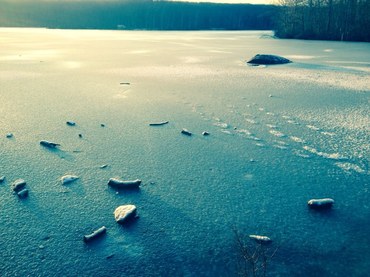
Winter
How Nature Heals
There are probably scientific explanations for how the woods can heal us -- containing words like chlorophyll, oxygen, endorphins.
Other reasons nature soothes us are cloaked in mystery. It may have something to do with the elements our bones and blood are made of; or because nature leads us back towards the source. Being around trees that have stood generations longer than we have, and presumably will be here long after we're gone, gives us perspective, renews our faith in a more stable world. Walking in the presence of thousands of odd subterranean, amphibious and flying creatures who exist in a distinctly parallel realm -- connects us to something larger.
In the woods, a cacophony of sounds wash over us: bird song, creaking limbs, the wind whipping water. Sometimes we're happy to be surrounded by their strangeness; at others we try to make out the notes. Was that last piercing song a hawk or a vulture? When we hear a rare sound we can actually identify, a dove coo, a woodpecker drill, an owl hoot; it excites us, makes us feel more attuned.
We learn as we watch the world changing. There are the tadpoles in the shallow pool. Here's the great blue heron first returned in the spring. There's that nasty fisher cat scurrying across the ice. They become more familiar, and slowly, gain admittance to our world.
Things that we can't name are the true gifts. When we don't know things names; we are like children struggling to describe them, to understand them. We learn a new language after we have grappled for words.
The slow, mindful practice of woods walking -- making an effort to process but not attach to negative emotions, taught me these things. It made me more aware of the transitory nature of emotions, and my own stupid obsessions. Often the beauty I saw around me left an indelible imprint, distracting me from internal drama.
Every once in a while, I glimpsed something that evoked more intense feelings; a pink lady slipper orchid that had just bloomed, a dragonfly sitting near me on the rock for an hour, the sweet scent of honeysuckle in the air. Everything slowed. A warm peace settled me. Complete thoughts formed, emerging from some half remembered primordial place.
"I don't have to go anywhere," the words echoed inside me. "Anywhere I am is home."
Part one in an essay series called God in Other Places. God in Other Places. 1. The Woods

